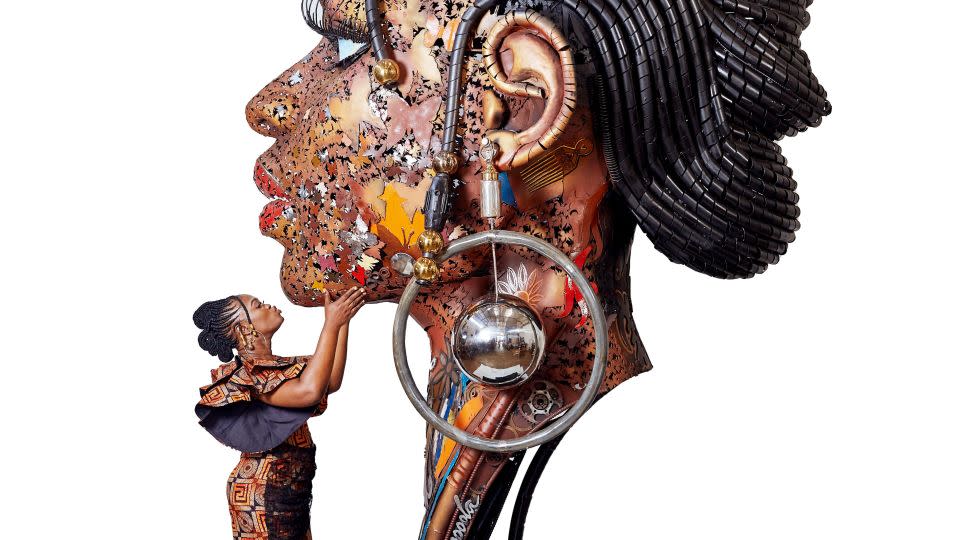A stunning metal sculpture shows ‘the beauty of Black women all over the world’
Celebrating the beauty of Blackness and protesting “environmental decadence” for a cleaner, waste-free future: that’s the vision of award-winning Nigerian metal sculptor and visual artist Dotun Popoola.
Popoola has carved a niche for himself by transforming scrap metal into colorful sculptures of animals and people, which tackle issues including waste management and the importance of recycling.
“My art is rooted in the use of discarded materials like motorcycle tanks, brake pads, car struts, bolts, nuts, and electric generator parts, all of which symbolize the visible signs of infrastructural decay in Nigeria,” Popoola told CNN.
Popoola’s most recent sculpture is a 12-foot-tall, 882-pound piece depicting the decorated head and neck of an African woman, inspired by his wife. Called “Irinkemi Asake ” — which roughly translates to “metals have enhanced my life” in the Yoruba language — it was recently displayed as a part of the Artmiabo International Art Festival in Lagos.
Composed of over 4,000 tiny metal butterflies, each individually welded and cut by hand, the sculpture is made from discarded metal, galvanized pipes, automobile parts, stainless steel, and wrought iron, and is coated with an anti-rust finishing and UV protection.
“The work showcases the beauty of Black women all over the world,” Popoola said of the piece, which he began in 2022.
“At first glance, you would see her graceful curves, raw beauty, and her innate power. But it also represents the pain that Black women have gone through. Each piece of fragmented scraps and butterflies tells a story of her struggles and triumphs, of hardships endured, and barriers overcome.
“Everything you see in the sculpture, it’s about bringing out the beauty of Blackness. Women create our life, they give us life and they make life meaningful to us.”

In less than 24 hours of unveiling the sculpture on Instagram earlier this year, Popoola had received over 50,000 followers from across the globe.
“I even received a beautiful message from Naomi Campbell,” he said. “The amount of support shown by women all over the world made me shed tears of joy in my studio. I knew I’d got it right.”
On the day of posting the reveal, Popoola received a message from Tera DuVernay, the deputy director of Legacy Museum in Montgomery, Alabama, and sister of American filmmaker Ava DuVernay. The museum tells the story of slavery in America and its legacy.
“Tera told me how much she loved the sculpture and wanted to know how she could get it to her museum in Alabama,” said Popoola.
“I’ve had work displayed in Dubai, Qatar, India, all over the world — but none of them are in museums. I told myself it wasn’t about making money, it’s about the fact that the sculpture is going to the best place possible.”
The sculpture is being shipped to the museum in time for its Juneteenth concert, featuring jazz musician Wynton Marsalis, and others, where it will be unveiled in the 17-acre Freedom Monument Sculpture Park as a celebration of Black courage and resilience.
Bryan Stevenson, founder and executive director at the Equal Justice Initiative, which set up the Legacy Museum said in an email: “We are thrilled to have Dotun Popoola’s extraordinary sculpture, Irinkemi Asake, at Freedom Monument Sculpture Park.
“The park explores the pain, trauma and suffering of millions of Black people who were enslaved in the Americas but it also illuminates the resilience, fortitude and capacity to love this community nurtured.
“Mr. Popoola’s work is well situated at our site because it brilliantly represents strength, beauty and resourcefulness which are precisely the attributes we want to celebrate among those who survived enslavement.”
“Environmentalist, activist and artist”
It’s a crowning achievement for Popoola, whose artistic flair emerged at a young age — although even then his output was unconventional.
“My childhood creative explorations always consisted of me getting into trouble,” he said. “My dad had a beautiful leather chair in our family home. I remember using a sharp razor blade to carve patterns into the material when I was nine.”
To cultivate his son’s passion, Popoola’s father enrolled him into an art class where he was taught to paint and sculpt, and he later attended Obafemi Awolowo University in Nigeria to study sculpting for his master’s degree, which he completed in 2014.
In 2015, he found a mentor in the US state of South Dakota, where he spent the summer learning how to weld metals. Upon his return to Lagos, Popoola began experimenting with using scrap metal.
“It became my visual language,” Popoola said. “For me, I feel as though I’m doing the job as an environmentalist, activist and artist all in one. Art should be a catalyst for change, a tool for examining our sociocultural landscape, a means of reengineering, and a form of protest against environmental degradation.”
To spread his mission, Popoola has set up his own Scrap Art Museum focusing on nurturing young talent across Africa. The museum — which is based in Osun State, Southwest Nigeria and decorated with 3D art from recycled materials — trains young creatives and inspires them to contribute to the local art community. He also employs local people to collect metal for the museum and his own work, which he says gives them the opportunity of a steady income.
For Popoola, success is measuring just how far he’s progressed as an artist. “I want to tell my story. I want to tell my truth with my work,” he said. “Most importantly, I want to tell young artists to keep the hope alive. If you keep doing what you do, one day you’ll be in the spotlight and the world will be watching.”
For more CNN news and newsletters create an account at CNN.com
